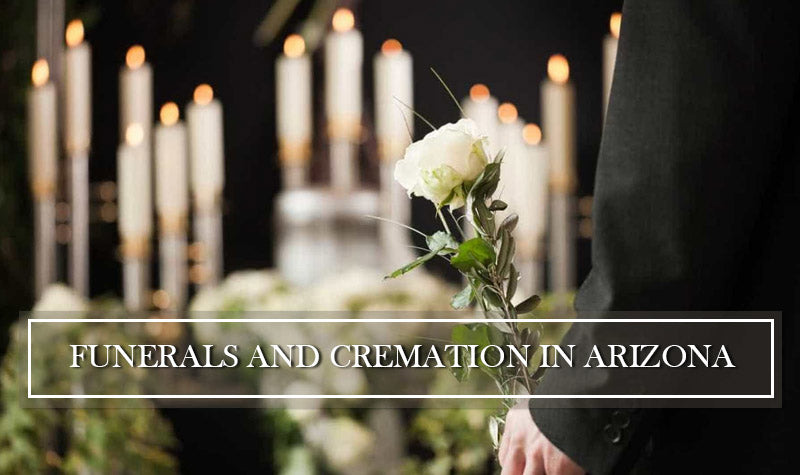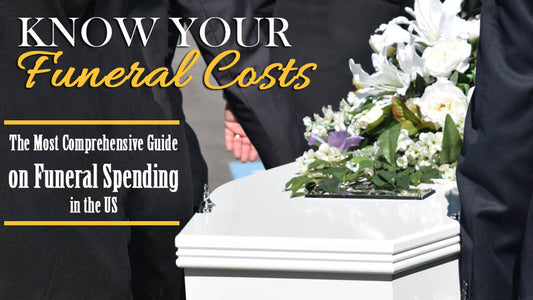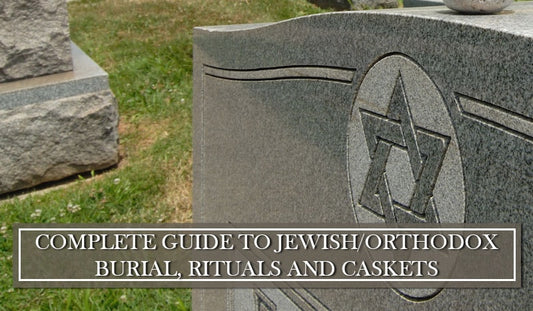
Rules and Regulations for Funerals, Burials and Cremation in Arizona
Every state has rules and regulations about what happens to the body of a deceased person. However, many states have specific laws on embalming, cremation, burial, or scattering the ashes. The rules can also be different even on the procedure of obtaining the death certificate. Should you live in Arizona, the following guide will clear all things out when it comes to funerals, burial and cremation.
What’s the procedure for obtaining a death certificate in Arizona?
No longer than seven days can pass until you register the death with the local or state registrar in the state of Arizona. The person in charge of the deceased's remains, the funeral home, the crematory organization, or the mortuary have the right to file for the death certificate.
When the person dies in the nursing home, hospital, hospice, or was treated for a chronic/acute medical condition causing the death, it's the health care provider who completes the medical certification of death. The treating doctor notifies the health provider, who has 72 hours from death for completing the death certificate.

When do you need a death certificate?
You will need several copies of the death certificate. One is for your record, but you may need several copies when you're dealing with the deceased’s affairs upon their death.
Every time you will request benefits or properties that belonged to the deceased, life insurance including payable on death accounts, or social security benefits, you will need a copy of the death certificate.
The procedure to obtain the death certificate
The most straightforward method for obtaining the death certificate is to request the organization/person to file the document to request for you. Should you be the executor of the estate, you may need at least ten copies.
If you need the copies after the time of death has passed, you have to get in touch with the health department in the county where the death took place. Get more information from the website of the Arizona Department of Health services.
What is the cost of a death certificate in Arizona?
You only need to pay $20 for a certified copy of the Arizona death certificate, and as little as $5 for non-certified copies. You need a copy of a signed photo ID (front and back) for obtaining the death certificate. A notarized transcript of your signature can also work, but you need to provide proof that you have the right to record.
Who’s legally permitted to request a death certificate in Arizona?
Only persons older than 18 years can obtain a certified copy of the death certificate in Arizona. Here’s who can apply for one:
- The spouse, close family member, grandchild/ or grandparent of the deceased
- A person who isn’t the attorney, but has the legal interest in the certificate
- The attorney representing the dead person's estate. It can also be a person or a family member with a lawful interest in the paper
- An executor
- A funeral director or the person in charge of taking care of the deceased's remains
- A third party with authorization from a family member or spouse
- An insurance company/financial institution where the dead had an account or policy
- The healthcare institution/hospital where the dead had a balance unpaid
- A person authorized by the attorney
- A beneficiary of the dead's life insurance policy
- A government agency
Even if there are some limitations, a genealogical researcher can also obtain a non-certified copy of a death certificate.
What’s the best way to select the funeral home/cremation provider?
There are almost 200 funeral homes and cremation providers in Arizona, and three significant zones to check: Mesa, Tucson, and Phoenix.
It's a good thing that there are so many options to choose from, but it can get confusing when selecting the funeral home. Your friends and families can have some suggestions. The funeral prices cover all kinds of budgets, so look for several options before hiring a funeral home.
In the state of Arizona, any "authorizing agent" can take care of a funeral. The spouse, the next of kin, or the adult person defined as a healthcare power of attorney may take the “authorizing agent” role.
Burial or cremation? What’s the choice?
It’s fundamental to decide between the two when it comes to funeral arrangements. Some funeral homes may be more experienced when it comes to organizing traditional funerals, for instance.
Do you want a full-service funeral and need a location that allows both visitation and chapel? As for cremation, it seems that Arizona has a high rate of cremation, at 60%. Therefore, numerous funeral homes also provide cremation services.
Think about what you want and write down your wishes when selecting the funeral home. Cremation is the most affordable choice in terms of disposition of the remains. It’s because you no longer need a casket, burial vault, grave marker, or cemetery plot.
Do you need the casket for burial or cremation?
Most of the time, the casket is the most significant investment of the funeral. You can pay anything from $700 to $20,000 and even more for a container. Where you buy the casket from matters in terms of price.
See our selection of caskets, shipped fast throughout the entire State of Arizona.
Is the casket mandatory for a burial?
No laws are requiring you to use a casket in the state of Arizona for burial. It doesn’t mean that cemeteries don’t have their own rules regarding the use of caskets. Cemeteries may also have their own set of requests regarding the type of container. So even if it’s not required by law, you need to buy a casket, since it is required by funeral homes and cemeteries.

What kind of casket can be used for cremation?
If cremation is chosen, typically, people use special cremation caskets or an alternative container. There is various types of containers. Fiberboard pressed wood, or unfinished wood can be materials used for alternative containers. Some of them look exactly the same as a regular casket and can be suitable for viewing as well but those caskets have to be made by crematorium requirements.
Is it mandatory to purchase the casket from a funeral home?
According to the federal law in Arizona, funeral homes must make caskets that you have bought from other sources, online retailers included. Should you be interested in building a coffin, the law doesn't forbid you from doing it and using the casket for the funeral.
What are the common locations for burials in Arizona?
More often than not, the burial locations are in cemeteries. However, there is no law in Arizona forbidding you to bury the body on a private land. It doesn't mean that there are no local governments that provide rules regarding burials.
Therefore, if you plan to bury the body on a family cemetery or private land, you need to check the city zoning and county regulations as well. Along with the container for burial, cemeteries request for a grave liner. The grave liner is fundamental for protecting the structure of the burial place, but it also reduces the risk of collapse. The vault liner can also be mandatory in several cemeteries. They can also have rules about the height of the grave marker. Should you be interested in the above-ground burial, some cemeteries provide the option as well.
In Arizona, it’s necessary to state the cemetery’s location with the county recorder’s office. You need to do it before the burial. The state or local registrar doesn’t give the burial permit unless the cemetery is found in the county recorder. It’s also possible that the cemetery is on tribal or federal land.
Can anybody make the funeral arrangements in Arizona?
Arizona law establishes who has the legal right for planning the funeral and body disposition, no matter if it's cremation or burial. The next categories of people have the constitutional right and responsibility for organizing the funeral:
- The spouse, as long as the partners aren’t lawfully separated at the time of death. If there was a pending petition for legal separation or divorce, the spouse could not make the funeral arrangements anymore.
- The agent defined by the health care power of attorney. However, a document has to give the agent the legal authority for making the funeral arrangements
- The adult children
- The parents
- The sibling
- Adult grandchildren
- The grandparent
- A person who showed care and concern for you
- A person defined as “guardian” at the moment of death
- Any other person authorized to make the funeral arrangements
If several people can handle the funeral, the final arrangements can be made by anyone, as long as there are no other person objects. When someone is objecting, most members must make a decision on who will be in charge of the funeral/cremation.
The Record of Emergency Data allows the military professionals to name the adult preparing the funeral.
Who's making the funeral arrangements when there are both a surviving spouse and a named person?
Even the law states the order of preference, and sometimes there can be a conflict between the spouse and the person one names. It’s common for spouses to name each other as the health care agents. However, it's not the same for everybody.
The Arizona law on funeral decisions presents a conflict. The ruling highlights that the surviving spouse has the ultimate power. However, there's another Arizona law that allows one to make a document with final wishes. The regulation doesn’t ask for funeral service providers to check with anyone before completing the instructions.
At the same time, another law in Arizona also lets you utilize the health care power of attorney for naming the person who will take care of the funeral. This law doesn't mention anything about the power of the surviving spouse of canceling the designation. Should you expect any conflicts, it's wise to have a talk with an estate planning attorney.
Are funeral arrangements affordable in Arizona?
Most of the time, you will pay about $6,000 - $8,000 for a traditional funeral with viewing and burial services in Arizona. The number doesn’t include the cemetery costs, flowers, markers, or obituaries.
Unlike other nearby states, funerals in Arizona cost less. Some state that the prices are lower because many people choose cremation instead of a traditional burial. In some cases, a direct cremation can cost you less than $800, whereas conventional funeral services can go as high as $2,400, without considering the price for the casket.
It seems that the prices for funeral services have not changed much for several years. Some funeral providers haven't changed the costs of cremation services ever since 1995. It's incredible, especially since the funeral costs have gone high across the U.S.
Can you pay in advance?
You can pay in advance for the funeral arrangements in Arizona. However, you need to check the funeral establishment and make clear documents for your plans, so that the survivors can easily follow through.
Even if the law asks the providers of funeral services and goods to handle your funds, the risk for abuses is never null.
Is it legal to have funds for funeral arrangements?
The safest and most straightforward way to cover the spending of the final arrangements is to think about the costs and set funds aside. The funds should be easy to access. It's effortless to name a beneficiary who can ask for the funds right after your death. The recipient has to be aware of the purpose of the money. Ideally, it's someone you completely trust. There are no legal obligations for the beneficiary to utilize the funds exclusively for the funeral arrangements.
Do you need to write down the funeral plans?
In Arizona, it's lawful to establish e a legally binding document with your wishes regarding the funeral services. Writing the paper helps your survivors not to stress about important decisions, such as the type of casket or final dispose of your remains.
It's mandatory to sign the final arrangements document and to notarize it. A competent adult can also witness it. If you have also made the financial arrangements for covering the spending, your wishes will be cared through.
Is embalming mandatory in Arizona?
Even if embalming is pretty standard, it's not necessary regularly. Refrigeration may also replace embalming.
In the state of Arizona, the body must be refrigerated or embalmed when the funeral/final disposition doesn't happen within 24 hours. If the body is shipped, embalming will be necessary.
What are the main characteristics of direct cremation? What are the rules regarding direct cremation in Arizona?
With cremation becoming more and more popular as we speak, it makes sense that direct cremation service has risen a lot in the last years.
In the case of direct cremation, no ceremony or service is included. The body is collected from the place of death, taken to the crematory or funeral home. Once the waiting period is done, the cremation takes place. The funeral home or the cremation provider manages the body, completes the legal papers and obtains the necessary permits. The body is cremated, and the remains are delivered to the family.
How much will you pay for direct cremation in Arizona?
In Arizona, Direct Cremation is anything from $650 to $900 if you hire a memorial provider and area you live in. A direct cremation is almost never as expensive as traditional funeral. Additionally, it ensures flexibility as families can decide how to pay their respect for the deceased
What are the laws on cremation in Arizona?
In Arizona, the crematory activates according to the practice standards regarding the cremated remains' disposal. The "Cremation Authorization Form” has to be signed by both the coroner and the lawful next of kin before cremation takes place.
Twenty-four hours is the legal waiting period before the cremation occurs. It takes around three days or so before all the arrangements and papers are filled in. The law doesn't require the use of a casket in the case of cremation. However, a proper rigid container is demanded. Plywood or reinforced cardboard are the typical materials used for cremation containers. If a funeral service takes place before cremation, you can rent a casket from the funeral home.
Can you spread the ashes anywhere?
Where you're going to scatter the ashes is entirely up to you in the state of Arizona. However, a county medical examiner must agree with the cremation, whereas an authorizing person (next-of-kin or executor) has 15 days of the death until signing the authorizing cremation. Cremation ashes don’t pose any risk for health, so scattering the ashes can be done following common sense.
Spreading ashes on public land
It’s better to check the city and county regulations and zoning rules before spreading the ashes on local public ground. Many people use their best judgment when scattering the ashes on public ground, proceeding according to their wishes.
Scattering ashes on private land
Should you wish to scatter the ashes on private property, no laws in Arizona stop you from doing it. If you want to spread the ashes on someone else's property, it makes perfect sense to get the owner's approval first.
Is it legal to spread the ashes at sea?

The federal Clean Water Act doesn't allow you to scatter ashes unless you're three nautical miles from land. If it's not a container that decomposes fast, you have to dispose of it separately. The EPA doesn't allow you to scatter ashes as beaches. It's also forbidden to do it in wading pools by the sea. Don’t forget to announce the EPA within 30 days before spreading the ashes.
The Clean Water Act includes the regulations on the spreading of ashes in inland waters such as lakes or rivers. In the case of inland water burial, the state agency managing the waterway must provide you a permit for scattering the ashes.
Can one spread the ashes on federal property?
If you're planning to scatter the ashes on federal land, you need permission. More often than not, the local or state property will not forbid you to scatter ashes, as long as you're doing it quietly and far from roads, trails, waterways, or facilities. Some national parks provide the regulations on scattering ashes; it's easy to check it online from their websites.
What’s the legal aspect of spreading the ashes by air?
Even if there are no state laws regarding the scattering of ashes, federal aviation laws don't allow dropping any kind of object that may hurt people or properties.
According to the U.S. government, the ashes aren't considered to be hazardous. As long as you're only scattering the ashes and don't drop the container too, you should be able to spread the ashes from the air as well.
What are the rules on green burials in Arizona?
The interest for “green burials” has been slowly increasing, and there are now more than 300 green burial sites across the U.S.
Not many mortuaries and funeral homes are certified by the Green Burial Council, which is a nonprofit institution stating the standards for eco-friendly "death care." The funeral homes don’t need to be certified with the group for ensuring green burials, though.
How does a green burial happen?
There are several ways to have a green burial. Typically, the body is placed in a biodegradable container and not a typical casket. The body isn't embalmed, and only biodegradable materials are used. The body can also be wrapped in various kinds of greenery for sustaining the breakdown process.
Is it as costly as conventional burial?
Green burial caskets cost about the same as conventional caskets. You can find coffins from $700 to $1,400. However, a green burial will cost less than a traditional funeral since there is no spending for embalming, vaults, or grave liners.
Do green burials pose a risk for health?
Some people worry that green burials present a risk for diseases as the body decomposes. However, you shouldn’t stress much about it. Once an organization isn't living anymore, the bacteria and viruses won't survive either. The risk of infection is shallow, even in the case of green burials.
Frequently Asked Questions
Q: Do you have to hire a funeral director in Arizona?
A: In all states, it's lawful to keep the body of the deceased at home after death. No laws in Arizona oblige you to hire a certified funeral director for a funeral. On the contrary, an Arizona rule stated that the body disposition permit could be released by a funeral director or any other responsible person.
Q: Is a permit necessary for transporting the body in the state of Arizona?
A: there are several situations when you have to obtain a disposition-transit permit. You need the license when moving the body outside the state of Arizona, and also when you take care of the remains. A certified copy of the death certificate is mandatory to have for achieving the burial transit permit.
Q: Can you have a home burial in Arizona?
A: No laws in Arizona forbid you from having a home burial. There are no local zoning laws either, but you don’t want to take any chances. Make sure you check the zoning rules before proceeding with a home funeral. It's possible to make a home cemetery when you live in a rural region.
The law requires you to register the location of the cemetery with the county office before burial takes place. The local/state registrar can provide a disposition-transit permit for interment in a cemetery. It can only be done if the county recorder includes the grave.
Q: Can someone obtain financial support with the funeral spending in Arizona?
A: One can get $485 for direct burial and only $386 for direct cremation. The money is paid straight to the funeral establishment.
Paying for the funeral spending in Arizona is a struggle for some families. Should you found yourself in that situation, you can check with the county social services department.
Many municipalities provide a specific amount of money that covers funeral/cremation costs for those on welfare. The budget also addresses people with no funds for paying funeral spending. It's a necessary sum, and the rules on who benefits from it are stringent.
Q: Can one donate the body in Arizona?
A: It’s legal to donate the body to science in Arizona. The University of Arizona is open to medical donations to science. Keep in mind that some limitations apply regarding donor acceptance.
Q: What can you do when the loved one dies outside Arizona?
A: Dealing with the death of a beloved person is a traumatic time, and it’s even more painful when the death happens away from Arizona. If that happens, and you wish to transport the deceased back home in Arizona for burial, you need the permit for transportation. Depending on the distance, embalming may be necessary.
Blog Author: Tim





